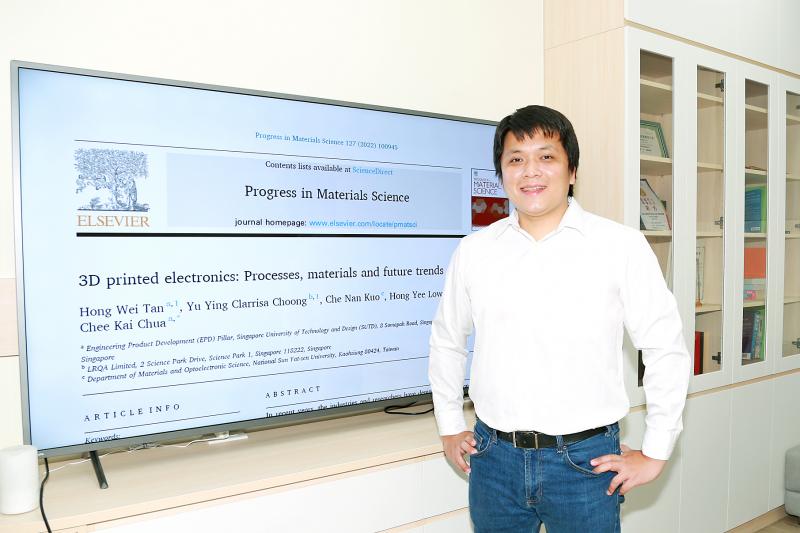A Taiwanese scientist has helped an international research team to create a compendium on making 3D-printed electronics, National Sun Yat-sen University said.
The university said in a press release on May 28 that previous literature on the subject is dispersed in the journals of separate fields, which makes finding information for applied science difficult.
In response, Kuo Che-nan (郭哲男), associate professor of material and optoelectronic science at the university, coauthored a study that collects all relevant knowledge about 3D printers and electronics in one document for researchers, the university said.

Photo courtesy of National Sun Yat-sen University
The study contains information on manufacturing processes, resins and the integration of advanced functions that especially benefits the making of flexible electronics, it said.
The information used in writing the article was gleaned over six months from 286 articles published in the past 10 years, the university said.
Combining 3D printing and flexible electronic technology could allow the low-cost development and manufacture of sophisticated, lightweight and aesthetically pleasing devices, Kuo was cited as saying.
Flexible electronics are used to make foldable cellphones, electronic paper and advanced prosthetics including electronic skin, “smart” clothing, heartbeat and blood pressure sensors, and other wearable devices, he said.
The material can also be used in implantable defibrillators, function-restoring prosthetics, motor vehicles and aerospace technology, he said.
A preview of the Singaporean-Taiwanese study was to be published in this month’s issue of Progress in Materials Science and a preview of the research is available on the journal’s Web site.
The study’s coauthors include professors Chua Chee Kai and Hong Yee Low, and researcher Hong Wei Tan at the Engineering and Product Development division of the Singapore University of Technology and Design, and Clarissa Choong, a senior technical consultant at global assurance provider LRQA.

Taiwan is stepping up plans to create self-sufficient supply chains for combat drones and increase foreign orders from the US to counter China’s numerical superiority, a defense official said on Saturday. Commenting on condition of anonymity, the official said the nation’s armed forces are in agreement with US Admiral Samuel Paparo’s assessment that Taiwan’s military must be prepared to turn the nation’s waters into a “hellscape” for the Chinese People’s Liberation Army (PLA). Paparo, the commander of the US Indo-Pacific Command, reiterated the concept during a Congressional hearing in Washington on Wednesday. He first coined the term in a security conference last

A magnitude 4.3 earthquake struck eastern Taiwan's Hualien County at 8:31am today, according to the Central Weather Administration (CWA). The epicenter of the temblor was located in Hualien County, about 70.3 kilometers south southwest of Hualien County Hall, at a depth of 23.2km, according to the administration. There were no immediate reports of damage resulting from the quake. The earthquake's intensity, which gauges the actual effect of a temblor, was highest in Taitung County, where it measured 3 on Taiwan's 7-tier intensity scale. The quake also measured an intensity of 2 in Hualien and Nantou counties, the CWA said.

The Overseas Community Affairs Council (OCAC) yesterday announced a fundraising campaign to support survivors of the magnitude 7.7 earthquake that struck Myanmar on March 28, with two prayer events scheduled in Taipei and Taichung later this week. “While initial rescue operations have concluded [in Myanmar], many survivors are now facing increasingly difficult living conditions,” OCAC Minister Hsu Chia-ching (徐佳青) told a news conference in Taipei. The fundraising campaign, which runs through May 31, is focused on supporting the reconstruction of damaged overseas compatriot schools, assisting students from Myanmar in Taiwan, and providing essential items, such as drinking water, food and medical supplies,

Prosecutors today declined to say who was questioned regarding alleged forgery on petitions to recall Democratic Progressive Party (DPP) legislators, after Chinese-language media earlier reported that members of the Chinese Nationalist Party (KMT) Youth League were brought in for questioning. The Ministry of Justice Investigation Bureau confirmed that two people had been questioned, but did not disclose any further information about the ongoing investigation. KMT Youth League members Lee Hsiao-liang (李孝亮) and Liu Szu-yin (劉思吟) — who are leading the effort to recall DPP caucus chief executive Rosalia Wu (吳思瑤) and Legislator Wu Pei-yi (吳沛憶) — both posted on Facebook saying: “I